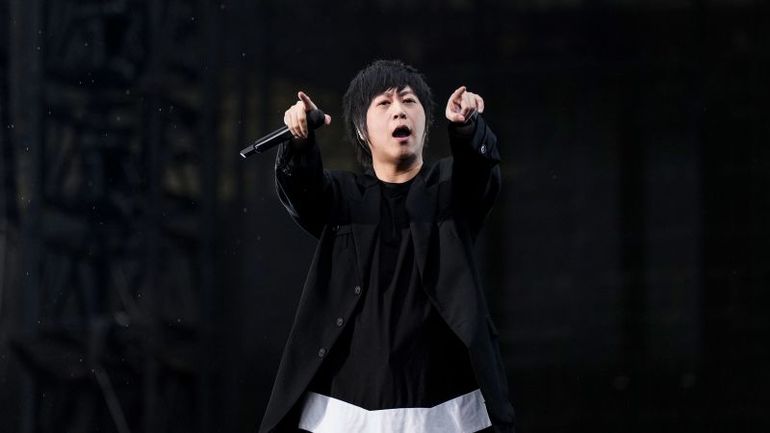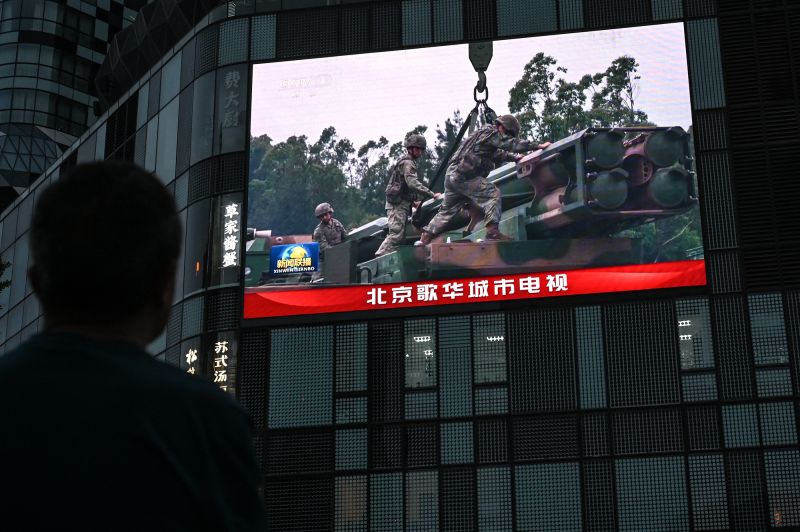
Taiwanese Celebrities Caught in the Crosshairs of Heightened Political Strife Amid Escalating China-Taiwan Tensions

Prominent Taiwanese celebrities are facing mounting scrutiny to align with Beijing's political stance, risking professional repercussions if they resist.
Taiwan's largest rock band performed in Beijing recently while back home, the island was facing Chinese aggression. Chinese warships and fighter jets surrounded the self-governing democracy for two days in the biggest military exercises in over a year.
Addressing the sold-out Bird’s Nest stadium filled with tens of thousands of fans, Mayday’s lead singer Ashin chose not to mention the aggression. However, his words still managed to stir up some controversy.
Instead, he exclaimed, “We Chinese people must eat roast duck when we come to Beijing!”
His simple travel tip carried a powerful political message. Ashin, a popular music artist in Taiwan, caused a stir by identifying as Chinese instead of Taiwanese.
The audience was thrilled by his choice of words, but it stirred up controversy and backlash in Taiwan. This highlights the delicate situation faced by Taiwanese celebrities who also have fans in mainland China.
Growing numbers of people in Taiwan, especially the younger generation, consider themselves distinctly Taiwanese. Many do not wish to be part of China, which considers the self-ruled island as its territory despite never having controlled it.
Beijing has been trying to strengthen its claims by highlighting the cultural and historical connections between the two sides. However, surveys indicate that only 3% of Taiwan's population primarily identify as Chinese. In contrast, 67% see themselves primarily as Taiwanese, with less than 10% supporting immediate or eventual unification with China.
Under the leadership of Xi Jinping, Beijing has become more aggressive toward Taiwan and has cut official ties since the island’s ruling Democratic Progressive Party took office in 2016. Despite this, there is still a strong cultural connection. Both sides speak Mandarin, so musicians from Taiwan, with a population of 23 million, often look to tap into the market of 1.4 billion people across the strait.
As Beijing and Taipei have grown further apart politically, Taiwanese artists have faced increasing pressure to align with Beijing’s political stance. For instance, while performing in Beijing, Taiwanese pop queen Jolin Tsai referred to Nanchang as "our Chinese city," which some Chinese fans interpreted as a suggestion of shared nationality between her and the audience.
Taiwanese pop queen Jolin Tsai performs in Singapore on January 18, 2013.
Taiwanese pop queen Jolin Tsai performs in Singapore on January 18, 2013.
On China's X-like platform Weibo, many Taiwanese actors, musicians, and celebrities shared a state media post supporting Beijing's assertion of sovereignty over Taiwan.
CCTV stated that "Taiwan independence" is not a viable option, and emphasized that the reunification of the motherland is inevitable. The post has gained significant attention, with nearly 18 million retweets since it was posted last Wednesday.
On Douban, a well-known platform for reviewing movies, books, and music, users created a list of close to 100 Taiwanese celebrities. The list includes information on whether each celebrity had shared the aforementioned post.
Some criticized Tsai for not reposting the message, despite her on-stage display of unity. A comment with 14,000 upvotes even suggested that her concerts in China should be suspended by authorities because she "had never spoken out directly."
CNN has contacted Tsai for her response to the situation.
CCTV publicly supported Taiwanese celebrities who shared its post on Saturday. They posted screenshots of 36 such reposts, sparking more criticism against those who didn't show their support.
A top comment with 55,000 upvotes questioned those who didn't endorse or take a stand, asking if they should still come to the mainland to make money.
Lin Chen-yu, a lecturer at Cardiff University, focuses on China's censorship of Taiwanese music. According to Lin, artists like Tsai and Mayday are encountering challenges due to the growing influence of digital nationalism in both government and private sectors. The marketing systems that promote mainland careers are designed to not provoke Beijing authorities.
"Increasingly, management or touring contracts for activities in China now have clauses that prevent celebrities from speaking out against the beliefs of the Chinese government," she explained. "This also extends to any support for Taiwan."
Celebrities who are seen as going against Beijing's political boundaries are frequently banned from the Chinese market, with their content being removed from TV and online platforms.
Musicians' work can be taken down from streaming platforms in China if their names are flagged as sensitive keywords by censors. This often happens automatically, according to Lin.
A shopping mall screen in Beijing shows news footage of China's military drills around Taiwan on May 23, 2024.
A shopping mall screen in Beijing shows news footage of China's military drills around Taiwan on May 23, 2024.
Jade Gao/AFP/Getty Images
Backlash at home
Mayday appear to have avoided upsetting officials in China during their Beijing show, but not so many of their Taiwanese fans.
Many Taiwanese people have fond memories of growing up listening to the band's cheerful pop rock songs that capture the essence of youth. The band, known for over 25 years, is even likened to the "Asian Beatles" by some fans. However, there is a growing sense of disappointment among many fans now.
A comment on Mayday's Facebook page expressed disappointment after the Beijing concert. The person mentioned how they used to like the band but now feel let down.
Another fan, who identified as Taiwanese, left a farewell message on Ashin's Facebook page.
CNN has contacted Mayday's record company B'in Music to get their input.
Taiwan's Mainland Affairs Council got involved on Monday, claiming that the Chinese Communist Party is making Taiwanese artists show their political views.
The council stated that such political tactics will not win the support of Taiwanese people, but rather increase their anger towards the Chinese Communist regime.
The remarks and retweets by Taiwanese artists of the CCTV unification post occurred during China's significant display of military strength near Taiwan. The Chinese military referred to the drills as a response to Taiwan's actions they deem as separatist, aiming to demonstrate their ability to take control.
That display of military strength was triggered by the appointment of Taiwan's new President Lai Ching-te, who Beijing openly dislikes for advocating for the island's independence and unique identity.
Lai Ching-te, who took office as the new president of Taiwan on May 20, 2024.
Lai Ching-te, who took office as the new president of Taiwan on May 20, 2024.
Ichiro Ohara/The Yomiuri Shimbun/AP
In response to the growing criticism from Taiwan towards the musicians, Lai decided to take a more reconciliatory approach.
"The situation of Taiwanese artists having to take a political stance in China is not a new occurrence and is likely to happen again in the future," mentioned the leader.
Under the roof of others, what matters most is not just what our artists say, but what they genuinely feel in their hearts. It is crucial for us to provide them with understanding and empathy.
Beijing officials have stated that the Taipei administration was incorrect in claiming that artists were being forced or pressured.
Zhu Fenglian, a spokesperson for the Taiwan Affairs Office, mentioned that Taiwanese celebrities who shared the Weibo “reunification” message were trying to show that both Taiwan and mainland China are Chinese. "These are genuine expressions of their emotions," Zhu added.
Taiwanese artists in the Chinese market will still face challenges, according to Lin from Cardiff University.
She mentioned, "It's a good opportunity for Taiwanese industries to reflect on the impact on our society. Sharing our work in China may come at a cost – a loss of freedom and independence."
Editor's P/S:
The article highlights the complex and delicate situation faced by Taiwanese celebrities who have fans both in Taiwan and mainland China. While musicians like Mayday and Jolin Tsai have enjoyed immense popularity in China, their recent actions have sparked controversy and backlash in Taiwan. Mayday's lead singer Ashin's use of the term "Chinese" to describe himself during a concert in Beijing drew criticism from Taiwanese fans who identify as distinctly Taiwanese. Similarly, Jolin Tsai's failure to repost a state media post supporting Beijing's assertion of sovereignty over Taiwan led to calls for her concerts in China to be suspended.
These incidents underscore the growing pressure on Taiwanese artists to align with Beijing's political stance. Digital nationalism and censorship in China have made it increasingly difficult for celebrities to express views that go against the Chinese government's beliefs. As a result, many Taiwanese artists are forced to self-censor or risk losing access to the lucrative Chinese market. The article also raises important questions about the impact of such political tactics on Taiwan's society and the loss of freedom and independence for Taiwanese artists.













